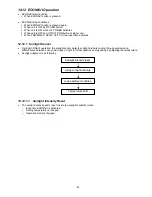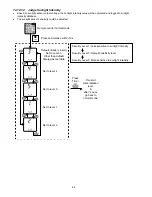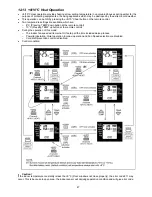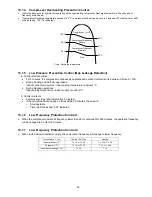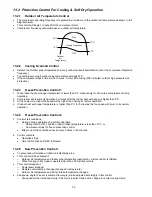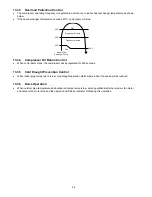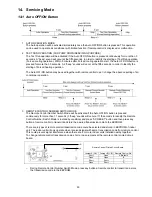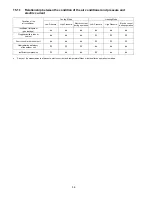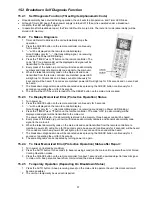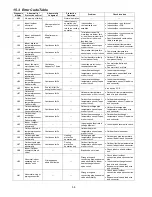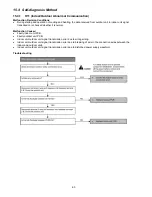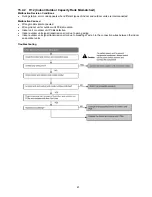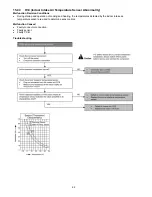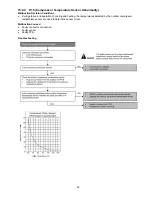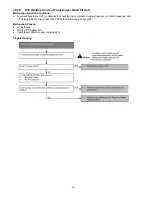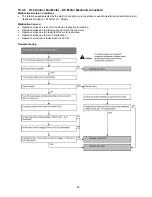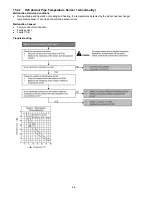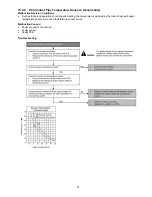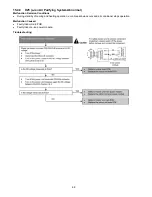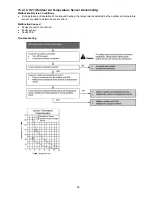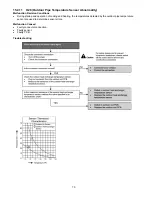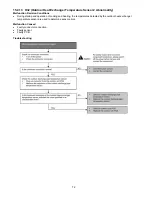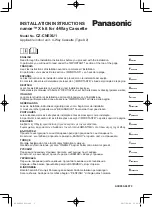
57
15.2 Breakdown Self Diagnosis Function
15.2.1 Self Diagnosis Function (Three Digits Alphanumeric Code)
•
Once abnormality has occurred during operation, the unit will stop its operation, and Timer LED blinks.
•
Although Timer LED goes off when power supply is turned off, if the unit is operated under a breakdown
condition, the LED will light up again.
•
In operation after breakdown repair, the Timer LED will no more blink. The last error code (abnormality) will be
stored in IC memory.
15.2.2 To Make a Diagnosis
1 Timer LED start to blink and the unit automatically stops the
operation.
2 Press the CHECK button on the remote controller continuously
for 5 seconds.
3 “- -” will be displayed on the remote controller display.
Note: Display only for “- -”. (No transmitting signal, no receiving
sound and no Power LED blinking.)
4 Press the “TIMER”
▲
or
▼
button on the remote controller. The
code “H00” (no abnormality) will be displayed and signal will be
transmitted to the main unit.
5 Every press of the button (up or down) will increase abnormality
numbers and transmit abnormality code signal to the main unit.
6 When the latest abnormality code on the main unit and code
transmitted from the remote controller are matched, power LED
will light up for 30 seconds and a beep sound (continuously for
4 seconds) will be heard. If no codes are matched, power LED will light up for 0.5 seconds and no sound will
be heard.
7 The breakdown diagnosis mode will be canceled unless pressing the CHECK button continuously for 5
seconds or operating the unit for 30 seconds.
8 The LED will be off if the unit is turned off or the RESET button on the main unit is pressed.
15.2.3 To Display Memorized Error (Protective Operation) Status
1 Turn power on.
2 Press the CHECK button on the remote controller continuously for 5 seconds
3 “- -“ will be displayed on the remote controller display.
Note: Display only for “- -”. (No transmitting signal, no receiving sound and no Power LED blinking.)
4 Press the “TIMER”
▲
or
▼
button on the remote controller. The code “H00” (no abnormality) will be
displayed and signal will be transmitted to the main unit.
The power LED lights up. If no abnormality is stored in the memory, three beeps sound will be heard.
5 Every press of the button (up or down) will increase abnormality numbers and transmit abnormality code
signal to the main unit.
6 When the latest abnormality code on the main unit and code transmitted from the remote controller are
matched, power LED will light up for 30 seconds and a beep sound (continuously for 4 seconds) will be heard.
If no codes are matched, power LED will light up for 0.5 seconds and no sound will be heard.
7 The breakdown diagnosis mode will be canceled unless pressing the CHECK button continuously for 5
seconds or operating the unit for 30 seconds.
8 The same diagnosis can be repeated by turning power on again.
15.2.4 To Clear Memorized Error (Protective Operation) Status after Repair:
1 Turn power on (in standby condition).
2 Press the AUTO button for 5 seconds (A beep receiving sound) on the main unit to operate the unit at Forced
Cooling Operation modes.
3 Press the CHECK button on the remote controller for about 1 second with a pointed object to transmit signal
to main unit. A beep sound is heard from main unit and the data is cleared.
15.2.5 Temporary Operation (Depending On Breakdown Status)
1 Press the AUTO button (A beep receiving sound) on the main unit to operate the unit. (Remote control will
become possible.)
2 The unit can temporarily be used until repaired.
Summary of Contents for CS-AE9NKE
Page 12: ...12 4 Location of Controls and Components 4 1 Indoor Unit 4 2 Outdoor Unit 4 3 Remote Control ...
Page 13: ...13 5 Dimensions 5 1 Indoor Unit ...
Page 14: ...14 5 2 Outdoor Unit ...
Page 15: ...15 6 Refrigeration Cycle Diagram ...
Page 16: ...16 7 Block Diagram ...
Page 17: ...17 8 Wiring Connection Diagram 8 1 Indoor Unit ...
Page 19: ...19 9 Electronic Circuit Diagram 9 1 Indoor Unit ...
Page 20: ...20 9 2 Outdoor Unit ...
Page 23: ...23 10 2 Outdoor Unit 10 2 1 Main Printed Circuit Board ...
Page 29: ...29 ...
Page 91: ...91 Figure 3 Figure 4 16 1 1 3 To remove discharge grille Figure 5 ...
Page 93: ...93 Figure 8 Figure 9 ...
Page 94: ...94 Figure 10 ...

